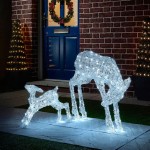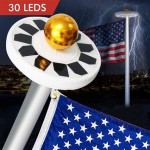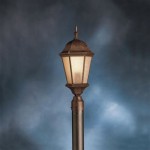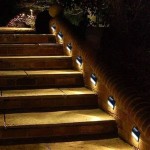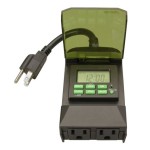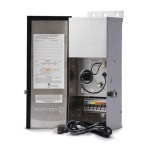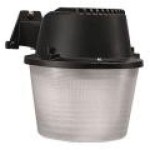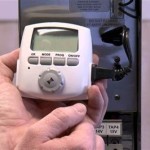How to Secure Outdoor Extension Cords
Outdoor extension cords are essential for powering tools, lights, and other devices in your yard, patio, or garden. However, using them carelessly can lead to safety hazards, such as tripping, electrocution, and fire. To prevent these risks, it is crucial to secure your extension cords properly. This article will explore key steps to ensure safe and secure outdoor extension cord usage.
1. Choose the Right Cord
Selecting the appropriate extension cord for your needs is the first step in securing it. Consider the following factors:
- Gauge (AWG): The gauge indicates the thickness of the wire, with lower numbers signifying thicker and more conductive wires. Higher gauge cords are better suited for higher-power appliances.
- Length: Choose a cord that is just long enough to reach the desired location, avoiding excessively long cords, which can increase resistance and cause overheating.
- Weatherproof Rating: Look for a cord with a weatherproof rating suitable for outdoor use. The most common ratings are:
- W: Water-resistant.
- WA: Water-resistant and approved for use in wet locations.
- W-A: Weatherproof, water-resistant, and approved for use in wet locations.
- SJTW: Suitable for temporary outdoor use and offers extra protection against water and weather.
- Ground Fault Circuit Interrupter (GFCI): For increased safety, especially in wet areas, use a GFCI-protected extension cord or a GFCI outlet. GFCIs detect electrical leaks and interrupt the power supply to prevent electrocution.
2. Secure the Cord from Tripping Hazards
Extension cords left lying on the ground pose a significant tripping hazard, especially in high-traffic areas. Here are several methods for securing your cord:
- Cord Covers: Use cord covers or raceways to conceal the cord and prevent people from tripping on it. These covers are readily available at hardware stores and come in various materials and designs.
- Cable Ties: Secure the cord to surfaces using cable ties or zip ties. Place the ties every few feet to prevent the cord from dragging or becoming tangled.
- Staples: If using a staple gun, be careful not to damage the cord's insulation. Staple the cord only to a sturdy surface and ensure the staples are not too close together.
- Cord Clamps: Cord clamps are available for attaching the cord to railings, fences, or other structures. These clamps provide a secure and organized method for securing the extension cord.
3. Maintain and Inspect the Cord Regularly
Regular maintenance and inspection are essential for maintaining the safety and functionality of an outdoor extension cord. Here are some crucial steps:
- Visual Inspection: Regularly check the extension cord for any signs of damage, such as cuts, abrasions, or frayed wires. Replace any damaged cords immediately.
- Plug and Outlet Inspection: Inspect the plugs and outlets for signs of wear and tear, such as broken prongs, loose connections, or exposed wires. Replace any damaged plugs or outlets promptly.
- Proper Storage: When not in use, store outdoor extension cords in a dry and cool location. Avoid leaving them in direct sunlight or extreme temperatures, as this can damage the insulation and shorten their lifespan.
- Avoid Overloading: Never overload an extension cord as this can cause overheating and fire. The cord's amperage rating should be equal to or greater than the appliance's power requirement.
Following these guidelines, you can minimize the risks associated with outdoor extension cord usage. By choosing the appropriate extension cord, securing it properly, and maintaining it regularly, you can ensure a safe and reliable power supply for your outdoor activities while minimizing potential hazards.

Twist And Seal Cord Protect Outdoor Extension Cover Plug Protection Green Tscp G 1000 The Home Depot

Twist And Seal Cord Protect Outdoor Extension Cover Plug Protection Black Tscp Blk Bl The Home Depot

Twist And Seal Cord Protect Outdoor Extension Cover Plug Protection Green Tscp G 1000 The Home Depot

Twist And Seal Cord Protect Outdoor Extension Cover Plug Protection Green Tscp G 1000 The Home Depot

3 Pack Outdoor Extension Cord Safety Cover Weatherproof To Protect Power Strips Timer Socket Holiday Light Decoration Green Com

Twist And Seal Cord Protect Outdoor Extension Cover Plug Protection Orange 2 Pack Tscp Or 2pk Pb The Home Depot

Ideas In Life Extension Cord Protector For Outdoor Cables Protect Connections Green Com

Cordsafe Extension Cord Plug Protector Safety Cover Water Resistant Outdoor Prevents Tripping Keep Cords Connected Green 1 Pack 2024 The Home Depot

3 Pack Outdoor Extension Cord Safety Cover Weatherproof To Protect Power Strips Timer Socket Holiday Light Decoration Green Com

Twist And Seal Cord Protect Outdoor Extension Cover Plug Protection Green Tscp G 1000 The Home Depot
Related Posts
